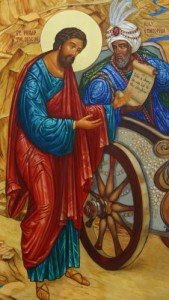The order of deacon can traces its roots, we know, back to the ancient church in Jerusalem. It was founded out of the necessity of performing the works of charity and the word in the early church. As the early church grew so did this holy order.
Around the year 200 CE a document was circulating called the Didache. This document was not scripture but was the first rule book for the day to day running of the ancient church. It gave instructions on many aspects of Christian life and the organization of the Christian community.
In section fifteen the early church set forth guidelines for appointing people to the office of deacon along with the office of bishop, similar to what was found in scripture. It says, appoint for yourselves, therefore, bishops and deacons worthy of the Lord, men who are meek and not lovers of money, and true and approved; for unto you they also perform the service of prophets and teachers. Therefore despise them not; for they are your honorable men along with the prophets and teachers
Many historians feel that the deaconate reached its golden age very early. Early in the third century, around the year 230, St Ignatius writes:
Everyone should hold the deacon in as great respect as Jesus Christ! For the deacons are fellow ministers or co-ministers in liturgy, in the word, in charity, in administration, and in authority.
At this time period the role of the deacon in the liturgy was also becoming more defined, along with his assistance to the bishop in the running of church administration. He was the leader of the community prayer, but not the presider. The presider’s role was held by the Bishop or Presbyter, the priest, as we know today.
After the legitimization of the Church by the Emperor Constantine the deacon’s active role in distribution of the Eucharist was starting to cause conflict between the other ordained ministers so much so that it was one of the lesser topics taken up at the First Council of Nicaea. Canon eighteen defined more clearly the role deacons have in administering the Eucharist, within the liturgical assembly. The council stated that it was not the role of the deacon to give communion to the bishop or presbyter, but that he was to receive the Eucharist from the bishop, because he ranked below that of the bishop or presbyter. It was also stated that deacons are not to sit among the presbyters, but assuming amongst themselves in the assembly.
It is from this point the church started to define more clearly the different roles of her ordained ministers and the development of their functions within the Church community. At this point the function of the deacon began to change from its original role, as we shall see in future articles.
During this month, Leonard will be going to Pittsburgh for two weeks to begin his studies

